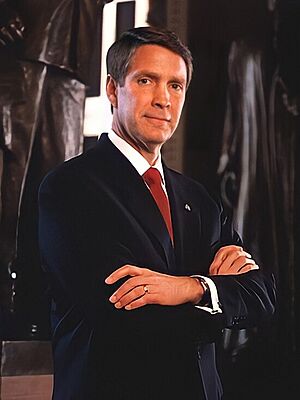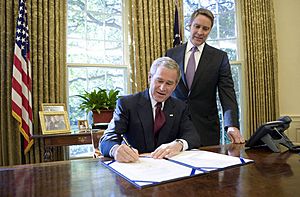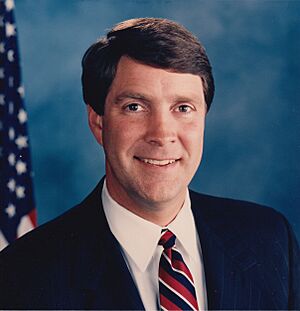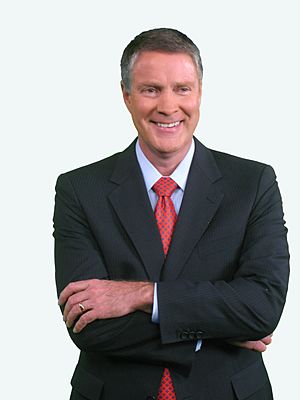Bill Frist facts for kids
Quick facts for kids
Bill Frist
|
|||||||||||||||||||||||||||||||||||||
|---|---|---|---|---|---|---|---|---|---|---|---|---|---|---|---|---|---|---|---|---|---|---|---|---|---|---|---|---|---|---|---|---|---|---|---|---|---|

Official portrait, c. 1995
|
|||||||||||||||||||||||||||||||||||||
| United States Senator from Tennessee |
|||||||||||||||||||||||||||||||||||||
| In office January 3, 1995 – January 3, 2007 |
|||||||||||||||||||||||||||||||||||||
| Preceded by | Jim Sasser | ||||||||||||||||||||||||||||||||||||
| Succeeded by | Bob Corker | ||||||||||||||||||||||||||||||||||||
|
|||||||||||||||||||||||||||||||||||||
| Personal details | |||||||||||||||||||||||||||||||||||||
| Born |
William Harrison Frist
February 22, 1952 Nashville, Tennessee, U.S. |
||||||||||||||||||||||||||||||||||||
| Citizenship | United States | ||||||||||||||||||||||||||||||||||||
| Political party | Republican | ||||||||||||||||||||||||||||||||||||
| Spouses |
Karyn McLaughlin
(m. 1981; div. 2012)Tracy Roberts
(m. 2015) |
||||||||||||||||||||||||||||||||||||
| Children | 3 | ||||||||||||||||||||||||||||||||||||
| Parent |
|
||||||||||||||||||||||||||||||||||||
| Education | Princeton University (AB) Harvard University (MD) |
||||||||||||||||||||||||||||||||||||
| Awards | Golden Plate Award | ||||||||||||||||||||||||||||||||||||
| Signature | |||||||||||||||||||||||||||||||||||||
William Harrison Frist (born February 22, 1952) is an American doctor, businessman, and politician. He served as a U.S. Senator for Tennessee from 1995 to 2007. As a member of the Republican Party, he also became the Senate Majority Leader from 2003 to 2007.
Born in Nashville, Tennessee, Frist studied government and health care at Princeton University. He then earned his medical degree from Harvard Medical School. He became a heart and lung transplant surgeon. He even started the Vanderbilt Transplant Center. In 1994, he won the election to become a U.S. Senator.
After leading a committee for Republican Senators, Frist became the Senate Majority Leader. In this role, he helped pass important laws for President George W. Bush. These included tax cuts and a new Medicare plan for prescription drugs. Frist left the Senate in 2007, keeping his promise to serve only two terms.
Today, he leads the global board of The Nature Conservancy, which works to protect nature. He also works in health care investment and hosts a podcast about medicine and policy.
Contents
Bill Frist's Early Life and School
Bill Frist was born in Nashville, Tennessee. His parents were Dorothy and Thomas F. Frist Sr.. His family had lived in Tennessee for many generations. His father was a doctor who helped start a big health care company called Hospital Corporation of America (HCA). Bill's brother, Thomas F. Frist, Jr., later became the head of HCA.
Frist finished high school in Nashville in 1970. He then went to Princeton University and graduated in 1974. In 1972, he had an internship with a Congressman. The Congressman told him that if he wanted to be a politician, he should first have a career outside of politics. So, Frist went to Harvard Medical School and became a doctor in 1978.
While in medical school, Frist did some medical experiments. He later wrote in his book Transplant that he felt pressured to succeed. He said that some of his actions were "heinous and dishonest." This topic came up during his first Senate campaign.
Bill Frist's Medical Career
After medical school, Frist continued his training in heart surgery. He worked at Massachusetts General Hospital. He also spent time studying in England. From 1985 to 1986, he trained at Stanford University School of Medicine. There, he learned from Dr. Norman Shumway, a famous heart transplant surgeon.
After his training, Frist joined Vanderbilt University Medical Center. He started a program for heart and lung transplants. He performed the first heart-lung transplant in the Southeast. In 1990, he did Tennessee's first single-lung transplant. In 1989, he founded the Vanderbilt Transplant Center. This center now performs many heart transplants.
In 1991, Frist even operated on Lieutenant Colonel David Petraeus. Petraeus had been shot in a training accident. Years later, they met again when Frist was a Senator and Petraeus was a General.
In 1992, Frist helped bring back the organ donation card to Tennessee driver's licenses. He received an award for his efforts. In 1995, while he was a Senator, Frist helped a person who had a heart attack in a Senate building. In 1998, he gave emergency help to victims of a shooting at the U.S. Capitol.
Frist often went on medical missions around the world. He helped people in Africa and responded to disasters like hurricanes and earthquakes. During his 20 years as a doctor, Frist performed over 150 heart and lung transplants. He also wrote many medical articles. He is certified in both general and heart surgery.
Serving as a U.S. Senator
In 1990, Frist met with former Senate Majority Leader Howard Baker. Baker suggested he run for the Senate in 1994. Frist started building support. He worked on a task force for Tennessee's Medicaid program. He also helped with the Bush-Quayle campaign in 1992.
During his 1994 election campaign, Frist promised to serve no more than two terms. He kept this promise. Frist won the election against Jim Sasser. He became the first doctor in the Senate since 1938.
In his 2000 reelection campaign, Frist won easily with 66 percent of the votes. His campaign organization was later fined for not sharing information about a loan. Frist paid a fine of $11,000.
Frist supported the Iraq war while in the Senate. He supported the first invasion and the war that followed.
Frist became well-known when two Capitol police officers were shot in 1998. Frist, being the closest doctor, gave immediate medical help. He was not able to save the officers, but he did save the shooter. Frist said that as a doctor, you are trained to respond in such moments.
As the only doctor in the Senate, Frist was the spokesperson during the 2001 anthrax attacks. He wrote a book called When Every Moment Counts after the attacks. It gave information on how to respond to biological agents like anthrax.

During his 12 years in the Senate, Frist served on many committees. These included committees on Finance, Health, and Foreign Relations. He also led the National Republican Senatorial Committee. He helped Republicans win back the Senate in the 2002 election.
Leading the Senate
On December 23, 2002, Frist was chosen as the Senate Majority Leader. He was one of the youngest Senate Majority Leaders ever. He had also served fewer years in Congress than most previous leaders.
Legislative Successes
In 2003, Frist had many successes in passing laws. He helped pass President Bush's tax cuts. He also helped create the Medicare Modernization Act. This act added a prescription drug benefit for seniors. Frist was also key in creating the President's Emergency Plan for AIDS Relief (PEPFAR). This program has saved millions of lives globally by fighting AIDS. Frist had seen the AIDS problem during his medical trips to Africa. He worked with other Senators to pass this important law.
Frist also supported global health efforts. He helped pass the Paul Simon Water for the Poor Act of 2005. This law made sure that providing safe water and sanitation was a goal of U.S. foreign aid.
After the anthrax attacks, Frist led the Senate to pass the Project BioShield Act. This act funded research to develop vaccines and treatments for chemical and biological attacks. In 2006, Congress passed another law to strengthen BioShield. These laws became very important during the COVID-19 pandemic.
Stem Cell Research
In 2001, President George W. Bush limited federal funding for human embryonic stem cell research. Frist supported the President at first. However, as science progressed, Frist changed his view. By 2005, fewer stem cell lines were useful for research. Frist believed the limits on funding were too strict.
In 2006, Frist led the Senate to pass a law that would expand federal funding for stem cell research. This law would have allowed funding for stem cells from embryos not used in fertilization. President Bush vetoed the law, and Congress could not override the veto.
Law on Online Gambling
In 2006, just before Congress ended its session, Frist added a law about online gambling. This law, called the Unlawful Internet Gambling Enforcement Act (UIGEA), was added to a larger bill about port security. The UIGEA later led to a government crackdown on some online poker sites.
Campaigns and Elections
In 2004, Frist gave a speech at the Republican National Convention. He talked about his background as a doctor and focused on health care. He supported the new Medicare prescription drug benefit. He also spoke about making changes to medical malpractice lawsuits. He wanted to limit the money courts could award for non-economic damages.
During the 2004 election, Frist visited the home state of the Democratic leader, Tom Daschle. Daschle's opponent won that election. Later, Frist and Daschle worked together on health care issues.
Frist kept his promise to leave the Senate after two terms in 2006. He did not run for reelection. He supported Bob Corker, who won the election.
After the Senate
Staying Involved in Politics
People thought Frist might run for president in 2008 or for Governor of Tennessee in 2010. But he did not run for either office.
In 2009, Frist said he would have voted for the Patient Protection and Affordable Care Act. This was different from most Republicans. In 2011, he asked Republicans not to try to cancel the health care law.
Business Ventures
In 2008, Frist became a partner in a company that invests in health care. He is now a special partner and chairman there. In 2013, Frist helped start Aspire Health. This company provided care for seriously ill patients at home. It became the largest company of its kind before being bought by another company in 2018.
In 2015, Frist co-founded Frist Cressey Ventures. This company invests in new health care businesses. He is still an active partner there. He also leads the board of Monogram Health. This company helps patients with long-term kidney conditions.
Helping Others: Philanthropy
In 2009, Frist started SCORE (State Collaborative on Reforming Education). This group works to improve K-12 education in Tennessee. Frist leads SCORE's board. Each year, he presents a report on the state of education in Tennessee. He supports higher academic standards and better ways to reward good teachers.
In 2010, Frist served on the board of the Clinton Bush Haiti Fund. This fund raised money for earthquake relief in Haiti. Frist also founded and leads Hope Through Healing Hands, a global health non-profit. He also leads NashvilleHealth, which works on community health. This group did a survey of Nashville residents' health in 2019. It also reviewed Nashville's response to the COVID-19 pandemic.
Serving on Boards
Frist has served on many different boards. He is currently the chairman of the global board of The Nature Conservancy. He has been on this board since 2015. He also served on the boards of the Robert Wood Johnson Foundation and the Kaiser Family Foundation.
He currently serves on the boards of several health care companies. He has also been on advisory councils for Harvard Medical School and Princeton University. Frist also served on the board of regents for the Smithsonian Institution. This board helps manage the Smithsonian museums.
From 2007 to 2010, he served on the board of the Millennium Challenge Corporation. This government group works to fight global poverty.
Other Activities
After leaving the Senate, Frist taught at Princeton and Vanderbilt Universities. He taught about international economic policy and health policy. Frist also co-chaired One Vote '08 with former Senate Majority Leader Tom Daschle. This campaign aimed to make global health a priority in the 2008 presidential election.
Since 2011, Frist has been a senior fellow at the Bipartisan Policy Center. He co-chairs its Health Project with Tom Daschle. Frist is also a trained pilot. He used his flying skills to visit all 95 counties in Tennessee while campaigning. He was also an active runner and completed seven marathons.
Books Written by Bill Frist
In 1989, Frist published his first book, Transplant: A Heart Surgeon's Account of the Life-And-Death Dramas of the New Medicine. In this book, he wrote about his experiences as a surgeon.
In 1995, he edited "Grand Rounds in Transplantation." This book shared case studies about organ transplants. In 1999, Frist co-authored Tennessee Senators, 1911–2001. This book looked at the leaders from Tennessee in the Senate.
In 2002, Frist published When Every Moment Counts. This book gave advice on how to stay safe during a bioterrorism attack. In 2003, Frist and Shirley Wilson released Good People Beget Good People. This book was about the history of the Frist family.
In 2009, Frist published A Heart to Serve. This book shared details about his family, his time as a surgeon, and his work as a U.S. Senator. It also covered his medical mission trips and important laws he helped pass. He also co-edited An Introduction to Health Policy in 2013.
Bill Frist's Personal Life
In 1981, Frist married Karyn McLaughlin. They had three sons: Harrison, Jonathan, and Bryan. They divorced in 2012. On May 29, 2015, Frist married Tracy Lynne Roberts. They live in Franklin, Tennessee.
Frist's family has given a lot of money to Princeton University. They pledged $25 million in 1997 for a new campus center.
Awards and Recognition
Frist was named one of the 100 Most Powerful People in Healthcare by Modern Healthcare several times. Time Magazine also named him one of the world's most influential people in 2005.
In 2001, he received the Golden Plate Award from the American Academy of Achievement. In 2003, Princeton University gave him the Woodrow Wilson Award. This award is for alumni who show leadership in public service.
In 2011, he received the Al Ueltschi Award for Humanitarian Leadership. This was for his life-saving work around the world. Between 1997 and 2006, Frist received honorary degrees from five historically black colleges and universities.
Images for kids
See also
 In Spanish: Bill Frist para niños
In Spanish: Bill Frist para niños
 | Frances Mary Albrier |
 | Whitney Young |
 | Muhammad Ali |



